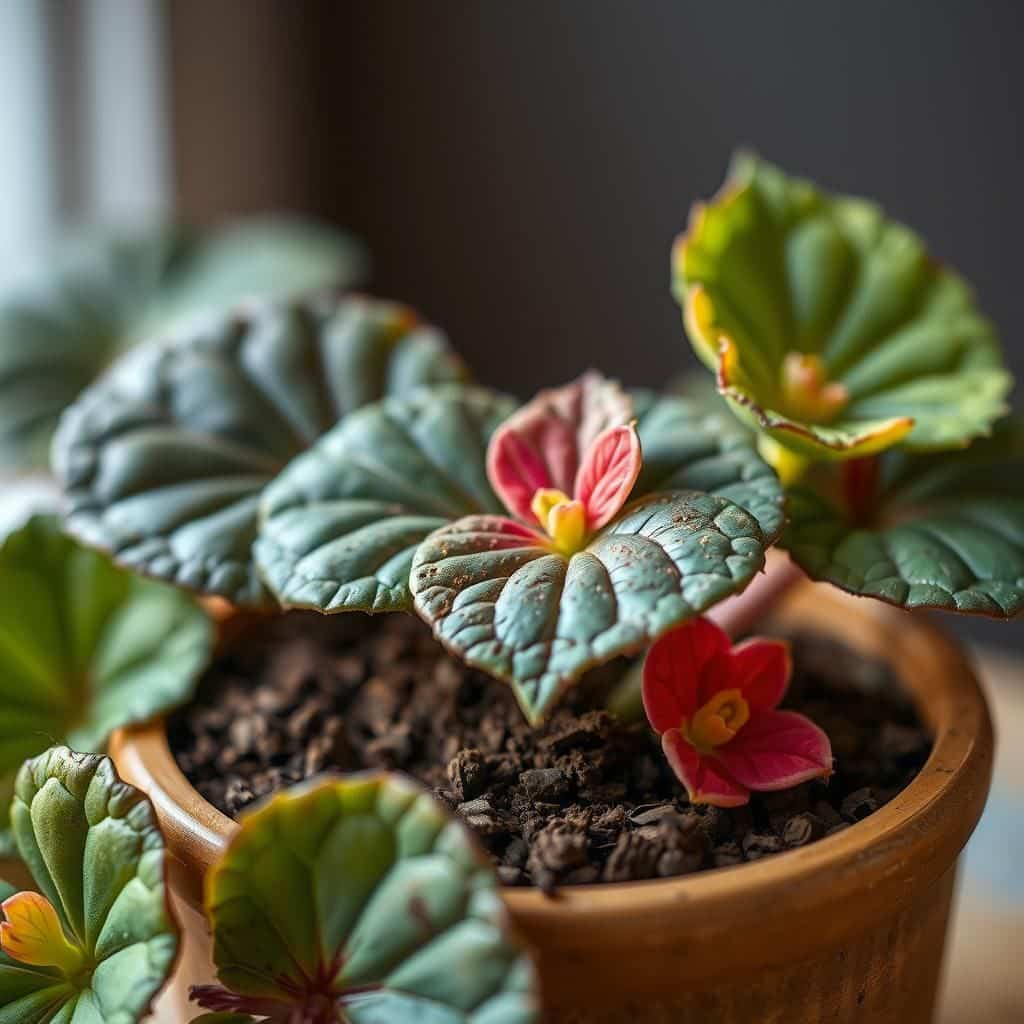Do Coffee Grounds Help Begonias? Discover the Benefits for Your Plants!

If you're a plant enthusiast looking to give your begonias a boost, you might have heard about using coffee grounds as a natural fertilizer. These often-discarded remnants of your morning brew could hold valuable nutrients that benefit your begonias. This article delves into the potential advantages of incorporating coffee grounds into your plant care routine. From improving soil structure to providing essential nutrients, coffee grounds might be the secret ingredient to healthier, more vibrant begonias. Join us as we explore the science behind this gardening trend and how you can enhance your plants' growth with this simple kitchen byproduct.
Do Coffee Grounds Benefit Begonias?
Coffee grounds can indeed be beneficial for begonias when used properly. These grounds are enriched with nitrogen, which is essential for healthy plant growth. When added to the soil, they can improve its structure, enhance drainage, and promote beneficial microbial activity. However, it's important to use coffee grounds in moderation, as excessive use can lead to soil acidity, which may not be suitable for all begonia varieties. A thin layer mixed into the potting soil or compost can provide the necessary nutrients without overwhelming the plants.
Benefits of Coffee Grounds
Coffee grounds offer several benefits for begonias, primarily because they are a rich source of nitrogen, making them excellent for promoting leaf growth and overall plant health. Additionally, they contain other essential nutrients like phosphorus and potassium, which can help in root development and flower production. The organic matter in coffee grounds can also improve soil texture and fertility, encouraging better water retention and drainage.
How to Use Coffee Grounds with Begonias
To effectively use coffee grounds with begonias, it's best to mix them into the soil rather than applying them directly on top. A good practice is to combine about 10-20% coffee grounds with potting soil or compost. This mixture helps to evenly distribute the nutrients without overwhelming the plant. It is also advisable to let the coffee grounds dry out before use to avoid clumping and potential mold formation.
Potential Risks of Using Coffee Grounds
While coffee grounds have many benefits, they also come with potential risks. One main concern is that they can increase soil acidity, which might not be suitable for all begonia species, particularly those that thrive in neutral or slightly alkaline soils. Additionally, using too many coffee grounds can lead to poor drainage, as they may compact when wet. This can cause root rot and other related issues.
Alternative Uses for Coffee Grounds
Apart from enriching the soil for begonias, coffee grounds can be beneficial in other ways. They can be used as an organic pest repellant, helping to deter pests like slugs and snails due to their coarse texture. Coffee grounds can also be added to compost piles to enhance nutrient content. Furthermore, they can be used as a natural fertilizer for other types of houseplants, making them a versatile resource in plant care.
Tips for Storing Coffee Grounds
To ensure that coffee grounds remain effective for use with begonias, proper storage is essential. Store used coffee grounds in a dry, airtight container to prevent mold growth and retain their nutrient quality. Additionally, keeping them in a cool area away from direct sunlight can help prolong their viability. Utilizing fresh coffee grounds as needed will ensure the best results when applying them to your begonia plants.
| Benefit | Description |
|---|---|
| Nitrogen Source | Promotes healthy leaf growth and overall vigor. |
| Improved Soil Structure | Enhances drainage and aeration in the soil. |
| Microbial Activity | Supports beneficial organisms that aid in nutrient cycling. |
| Pest Repellent | Helps deter slugs, snails, and other pests. |
| Organic Fertilizer | Can be used for various houseplants beyond begonias. |
Are coffee grounds ok for begonias?


Using coffee grounds in gardening is a topic of interest for many plant enthusiasts, including those growing begonias. Coffee grounds can provide several benefits for plants, but it's essential to understand how they affect begonias specifically.
Benefits of Coffee Grounds for Begonias
Coffee grounds can be beneficial for begonias due to their properties. They can enhance soil quality and introduce nutrients that can promote healthy plant growth. Here’s how:
- Nutrient Enhancement: Coffee grounds contain nitrogen, which is an essential nutrient for plant growth. This can support healthy foliage development in begonias.
- Soil Structure Improvement: The gritty texture of coffee grounds can improve soil aeration and drainage, which are vital for begonias.
- pH Level Adjustment: Coffee grounds can slightly acidify the soil, which may benefit begonias since they prefer slightly acidic conditions.
How to Use Coffee Grounds for Begonias
To effectively use coffee grounds for begonias, it’s crucial to apply them correctly to avoid any potential harm:
- Mixing with Soil: Combine one part coffee grounds with three parts potting soil to create a nutrient-rich blend.
- Top Dressing: Sprinkle a thin layer of coffee grounds on the soil surface as a top dressing, which will release nutrients gradually as it breaks down.
- Composting: Incorporate coffee grounds into your compost pile for an added nitrogen boost, which can benefit all your plants, including begonias.
Potential Risks of Coffee Grounds for Begonias
While there are benefits to using coffee grounds, there are also risks that gardeners should be aware of:
- Over-application: Using too many coffee grounds can lead to excessive nitrogen, which could cause root burn and damage the begonia.
- Attracting Pests: Coffee grounds can attract pests like snails and slugs, which may harm the plants.
- Mold Growth: A thick layer of coffee grounds can create a moist environment, encouraging mold growth that can affect plant health.
Alternatives to Coffee Grounds for Begonias
If you’re hesitant to use coffee grounds, there are various alternatives that can still provide benefits for begonias:
- Compost: Mature compost can provide a balanced source of nutrients without the risks associated with coffee grounds.
- Organic Fertilizers: Use organic liquid fertilizers designed for flowering plants to ensure proper nutrient ratios.
- Mulch: Organic mulch like bark or straw can enhance soil moisture retention and provide nutrients over time without the potential drawbacks of coffee grounds.
Research and Expert Opinions on Coffee Grounds for Begonias
While there is anecdotal evidence supporting the use of coffee grounds, expert opinions may vary:
- Gardening Experts: Many gardening experts advocate for moderate use of coffee grounds, emphasizing the importance of balance in nutrient application.
- Scientific Studies: Some studies suggest that while coffee grounds can benefit certain plants, the impact on specific species like begonias requires more research.
- Personal Experiences: Gardeners often share varying experiences with coffee grounds, showcasing different results based on specific conditions and types of begonias.
What plant does not like coffee grounds?


Certain plants do not benefit from the use of coffee grounds, as the acidity and nutritional content of these grounds can be harmful. One notable plant that dislikes coffee grounds is the African Violet. While coffee grounds can be beneficial for some plants, they can create an unsuitable environment for others, particularly those that thrive in neutral to slightly acidic soil.
Why African Violets Dislike Coffee Grounds
African Violets, or Saintpaulia, are sensitive to soil pH and do not thrive in highly acidic conditions. Adding coffee grounds can lower the soil's pH excessively, which leads to:
- Root Rot: High acidity can encourage fungal infections, harming the root system.
- Nutrient Deficiency: An imbalanced soil pH can inhibit essential nutrient absorption.
- Poor Growth: Excess acidity can lead to stunted growth and fewer blooms.
Plants That Thrive in Neutral or Alkaline Soil
Many popular houseplants prefer neutral or slightly alkaline soil, making them incompatible with coffee grounds. Examples include:
- Palm Trees: They flourish in well-draining, neutral soil conditions.
- Succulents: These plants dislike excess moisture and require a more neutral pH.
- Cactus: Like succulents, cacti need dry conditions and prefer slightly alkaline soil.
Alternatives to Coffee Grounds as Fertilizer
Instead of using coffee grounds, consider these alternative options that benefit a wide range of plants:
- Compost: A balanced mixture that can improve soil quality for most plants.
- Fish Emulsion: Rich in nutrients, it provides a great boost for flowering plants.
- Bone Meal: Offers phosphorus, which is crucial for root development and flowering.
Signs Your Plant is Affected by Coffee Grounds
If you suspect that coffee grounds are harming your plants, watch for these signs:
- Yellowing Leaves: A common sign of nutrient deficiencies related to pH imbalance.
- Wilting: Plants may show signs of water stress due to poor root health.
- Lack of Flowers: A reduction in blooming may indicate ongoing stress from soil conditions.
Best Practices for Coffee Ground Use
If you still wish to use coffee grounds in your garden, follow these best practices for safe application:
- Test Soil pH: Always test soil pH before adding coffee grounds.
- Limit Application: Use coffee grounds sparingly and mix with other organic materials.
- Observe Plant Health: Monitor your plants closely for any adverse effects after application.
Questions from Our Readers
Do coffee grounds provide nutrients for begonias?
Coffee grounds can be beneficial for begonias as they contain essential nutrients such as nitrogen, phosphorus, and potassium. These nutrients can help promote healthy growth and vibrant foliage. However, it's important to use them in moderation to avoid nutrient imbalances in the soil.
How should I apply coffee grounds to my begonias?
To apply coffee grounds, it’s best to mix them into the soil or add them to the compost pile. A thin layer on the surface of the soil can also work, ensuring it doesn’t become compacted, which helps maintain soil aeration and moisture retention for your begonias.
See also:
Can coffee grounds improve soil drainage for begonias?
Yes, coffee grounds can help improve soil drainage when mixed with heavier soils. Their coarse texture allows for better aeration and water retention when used appropriately, which is beneficial for the root system of begonias, preventing overwatering issues.
Are there any downsides to using coffee grounds for begonias?
While coffee grounds have many benefits, excessive use can lead to acidity in the soil, which may not be ideal for all growing conditions. It’s best to monitor the pH level of the soil and use coffee grounds sparingly to avoid potential harm to begonias.

If you want to read more articles like Do Coffee Grounds Help Begonias? Discover the Benefits for Your Plants!, we recommend you check out our Plants category.
Leave a Reply
Related Articles